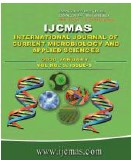


 National Academy of Agricultural Sciences (NAAS)
National Academy of Agricultural Sciences (NAAS)

|
PRINT ISSN : 2319-7692
Online ISSN : 2319-7706 Issues : 12 per year Publisher : Excellent Publishers Email : editorijcmas@gmail.com / submit@ijcmas.com Editor-in-chief: Dr.M.Prakash Index Copernicus ICV 2018: 95.39 NAAS RATING 2020: 5.38 |
A detailed analysis of retrospective data on bacterial culture and sensitivity documented in a tertiary care hospital in Puducherry was carried out, with an aim of assessing the feasibility of giving prompt treatment topatients with mono-microbialdiabetic foot ulcer infections. In a patient strength of 40, consisting of 30 males and 10 females,mono-microbial infection rate was 45.0% (18/40),andpoly-microbialinfection was 55.0% (22/40). About 55.5% of patients affected by mono-microbial infection were in the age group of 50 to 69 years, among whom, males formed a majority. Infection by a single pathogen was caused by 5-species of Gram-positive (lone) pathogens(namely, Staphylococcus aureus or MRSA,or CONS, or Enterococcus species, or Streptococcus species), affecting 10 persons; and by 7-species of Gram-negative (lone) pathogens ( namely, Pseudomonas species, or Pseudomonas aeruginosa, or Proteus species or Escherichia coli or Klebsiellaoxytoca). This is in contrast to the experiences of Western countries where mono--microbial diabetic foot infections are mostly reported to be caused by Gram-positive pathogens, whereas, Gram-negative pathogens are reported to be associated with mixed-flora of poly-microbial infections. The bacterial sensitivity data indicated that Amikacin was a promising drug for empirical therapy against all Gram-negative organisms involved, in mono-microbial infections, excepting Proteus vulgaris, against which Imipenem, or Levofloxacin was found to be effective. Amikacin was also effective against the three Gram-positive pathogens, namely, Staphylococcus aureus, MRSA and CONS, with the exception of Enterococcus species (against which either Penicillin or Vancomycin or Linezolid was individually effective), and Streptococcus species (against which either Penicillin, or Clindamycin was individually effective).
 |
 |
 |
 |
 |